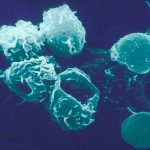Link to Pubmed [PMID] – 11050393
Curr. Biol. 2000 Oct;10(19):1221-4
Polymerase zeta (Pol zeta) is an error-prone DNA polymerase [1], which in yeast is involved in trans-lesion synthesis (TLS) and is responsible for most of the ultraviolet (UV) radiation-induced and spontaneous mutagenesis [2-4]. Pol zeta consists of three subunits: REV1, a deoxycytidyl-transferase [5]; REV7, of unclear function [6]; and REV3, the catalytic subunit. REV3 alone is sufficient to carry out TLS, but association with REV1 and REV7 enhances its activity [5, 7]. Experiments using human cells treated with UV radiation indicate also that mammalian Pol zeta is involved in TLS [7]. The peculiar mutagenic activity of Pol zeta [4,7,8] suggests a possible role in somatic hypermutation of immunoglobulin (Ig) genes [9]. Here, we report that, unlike in yeast where the REV3 gene is not essential for life [4], disruption of the mouse homologue (Rev3l) resulted in early embryonic lethality. In Rev3l(-/-) embryos, no haematopoietic cells other than erythrocytes could be identified in the yolk sac. Rev3l(-/-) haematopoietic precursors were unable to expand in vitro and no haematopoietic cells could be derived from the intraembryonic haematogenic compartment (splanchnopleura). Fibroblasts could not be derived from the Rev3l(-/-) embryos, and Rev3l(-/-) embryonic stem (ES) cells could not be obtained. This is the first evidence that an enzyme involved in TLS is critical for mammalian development.

